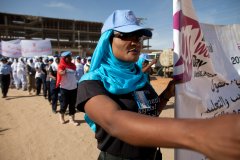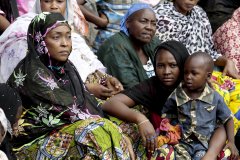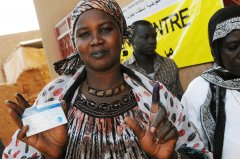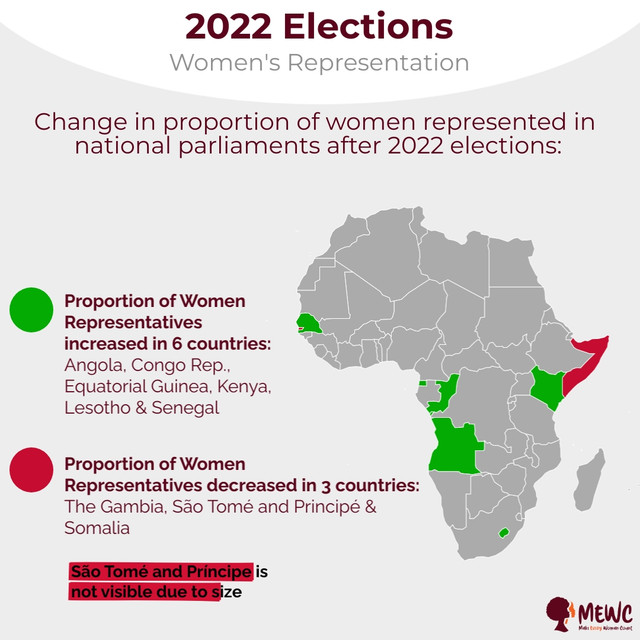Gender Issues Showlist
Women, Peace & Security
UNSCR 1325 calls on all parties to: protect and respect the rights of women and girls in conflict & post-conflict; increase women participation in all conflict resolution, peacekeeping and peace-building & to end impunity by prosecuting perpetrators of sexual and other violence on women and girls
index.php?option=com_content&view=category&id=56&Itemid=1913
Human Rights of Women
Thirty six years after the adoption of CEDAW, many women and girls still do not have equal opportunities to realize rights recognized by law. Women are denied the right to own property or inherit land. They face social exclusion, “honor killings”, FGM, trafficking, restricted mobility, early marriage,...
index.php?option=com_content&view=category&id=44&Itemid=1908
Violence Against Women
Violence against women is the most shameful human rights violation. Gender based violence not only violates human rights, but also hampers productivity, reduces human capital and undermines economic growth. It is estimated that up to 70 per cent of women experience violence in their lifetime
index.php?option=com_content&view=category&id=69&Itemid=1912
Political Participation & Leadership
Where women are fully represented, societies are more peaceful and stable. Women political participation is fundamental for gender equality and their representation in positions of leadership must be a priority for all Africans governments.
index.php?option=com_content&view=category&id=65&Itemid=1911
Latest News
- COTE D'IVOIRE: South-South Meeting to Promote Gender Equality and Combat Deforestation
- RWANDA: Rwanda Set to Launch Cervical Cancer Elimination Plan
- NIGERIA: Over 5,000 Nigerian Women Stranded in Iraq - Govt
- SUDAN: Healthcare Collapse Threatens Pregnant Women in Sudan's Sharg El Nil
- GHANA: President Nominates 12 More Ministers
- Senegal: Parliamentary election 2024
- Mauritius: Parliamentary election 2024
- Ghana: Presidential and Parliamentary Elections
- Botswana: Parliamentary elections 2024
- Algeria: Presidential Election 2024
SENEGAL: Grandma's Fight Female Mutilation
Source: All Africa
Bamako — In the southern Senegal village of Kael Bessel, female genital mutilation is no longer a taboo subject. Sexagenarian Fatoumata Sabaly speaks freely about female circumcision and girls' rights with her friends.
"We've found it necessary to abandon cutting - abandoning the practice has advantages for women," she told IPS. "Female circumcision has consequences such as haemorrhaging and it can even lead to death."
In Senegal, like other West African countries, grandmothers like Sabaly are generally the ones who decide girls should be circumcised. A 2008 survey in Vélingara, also in the south of Senegal, found nearly 60 percent of older women supported female genital mutilation. But a 2011 survey carried out by the Grandmother Project found fully 93 percent of the same group are now against FGM.
The Grandmother Project, an international non-governmental organisation which promotes community dialogue about cultural issues, has helped organise regular meetings in thirty-odd villages around Vélingara, to enable people to discuss questions relating to local traditions and values, particularly "koyan" - the rite of passage associated with FGM.
Religious leaders, traditional chiefs, local officials, youth and elders all take part. The public debates allow people to talk openly about the pros and cons of their cultural practices.
"Since excision has more disadvantages than advantages, people are slowly abandoning the practice," said Falilou Cissé, a community development advisor at the Grandmother Project in Vélingara.
"People have stopped the practice themselves. We have never asked people to stop it," she stressed.
The meetings emphasise the educational role of grandmothers in African societies, but beyond that they help break the silence around taboo subjects like FGM.
"I was for excision, personally, like many people, but the public discussions have helped me to change my position, to accept that in our culture, there are some values to preserve and others to abandon," Abdoulaye Baldé, the imam of a mosque in Vélingara, told IPS.
Today, thanks to Baldé's participation in the meetings, people around Vélingara know that FGM is not a religious obligation for Muslims. The involvement of opinion leaders has had a huge impact on changing the outlook on excision among grandmothers.
Fatoumata Baldé, a nurse-midwife in Kandia, a village near Vélingara, told IPS that she couldn't remember coming across a case of excision in the area since 2010.
"Previously, we were used to handling lots of cases of cutting gone bad at the clinic, because it's done without medical assistance," explained the nurse, also a regular participant in the debates.
Boubacar Bocoum, a Malian consultant who has studied FGM in several countries, sees in the Vélingara experience grounds for hope that the practice could be definitively abandoned across West Africa.
"The projects fighting against this practice generally target excisors, while it's really a community problem," he said. "If only one part of the community abandons it, the practice persists because the rest of the people are not engaged."
According to a study published by the NGO Plan International in 2006, FGM is practiced throughout the West Africa region.
"In Guinea, in Sierra Leone and in Mali, practically all women are excised," said the report. "In Niger and Ghana, the practice is limited to particular geographic areas and the national prevalence is less than 10 percent."





